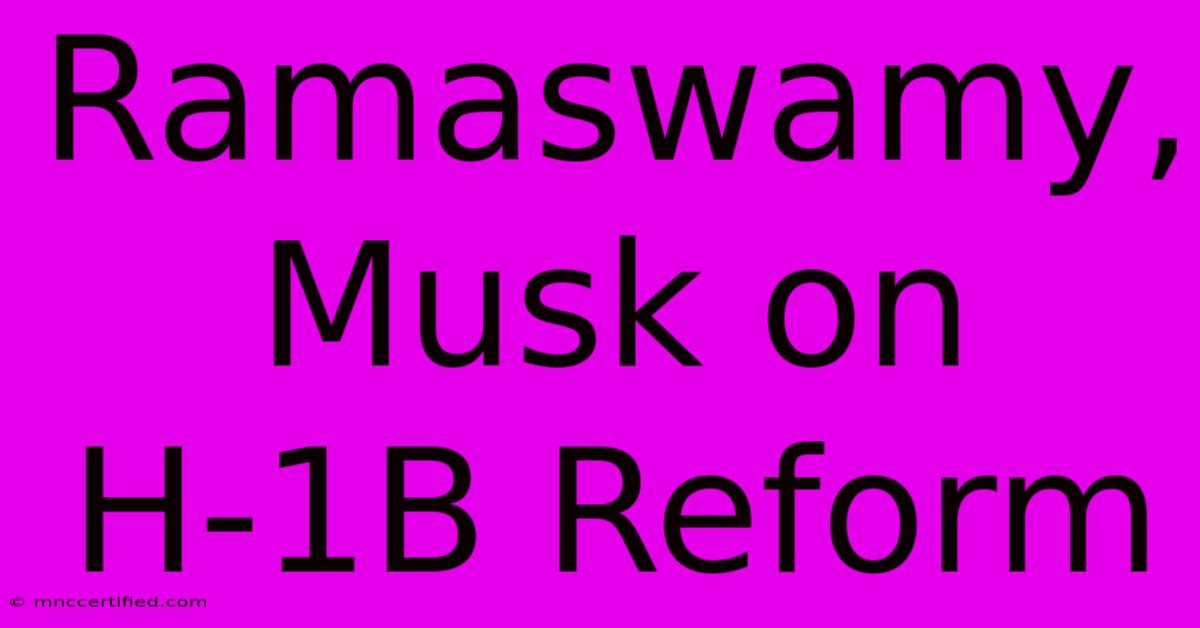Ramaswamy, Musk On H-1B Reform

Table of Contents
Ramaswamy, Musk on H-1B Reform: A Clash of Visions for American Tech
The H-1B visa program, designed to bring highly skilled foreign workers to the United States, has become a focal point of intense debate. Recently, Vivek Ramaswamy and Elon Musk, two prominent figures in the American tech landscape, have offered contrasting perspectives on necessary reforms, sparking a crucial conversation about the future of immigration and the tech industry. This article delves into their differing viewpoints, exploring the implications of their proposed changes and examining the broader context of the H-1B debate.
Vivek Ramaswamy's Stance: Prioritizing American Workers
Vivek Ramaswamy, a Republican presidential candidate and entrepreneur, has advocated for significant H-1B reform, prioritizing the needs of American workers. His proposals generally focus on restricting the number of H-1B visas issued, arguing that the current system displaces American talent and suppresses wages. He emphasizes the importance of strengthening domestic STEM education to ensure a robust pool of qualified American workers to fill high-skilled jobs.
Ramaswamy's core argument centers around the belief that the current system allows companies to exploit the H-1B program, potentially undercutting American wages and hindering the growth of the American workforce. He likely sees increased domestic STEM training and a reduction in H-1B visas as a more effective long-term solution to ensuring a skilled workforce. While he hasn't explicitly called for abolishing the program, his rhetoric suggests a significant curtailment is his preferred outcome. This approach aligns with a broader conservative stance emphasizing national interests and protectionist policies.
Elon Musk's Perspective: A Need for Skilled Labor
In contrast to Ramaswamy's more restrictive approach, Elon Musk, CEO of Tesla and SpaceX, has expressed a need for a more liberal H-1B visa system. While he hasn't explicitly endorsed the current system in its entirety, his concerns primarily revolve around the shortage of skilled labor in the American tech industry. He argues that restricting access to highly skilled foreign workers would hinder innovation and economic growth.
Musk's companies, known for their ambitious technological advancements, rely heavily on a global talent pool. A stricter H-1B system would likely limit his ability to recruit and retain top-tier engineers and scientists, potentially impacting his companies' competitiveness on a global scale. His perspective highlights the dependence of high-growth tech companies on skilled immigration. He likely advocates for reforms that streamline the process and ensure a steady flow of talent, rather than significant restrictions.
The Broader Context: Balancing Needs and Concerns
The contrasting viewpoints of Ramaswamy and Musk exemplify the broader complexities surrounding H-1B reform. The debate involves balancing the needs of American workers with the demands of a dynamic and globally competitive tech industry. Key considerations include:
- Wage suppression: Concerns persist that H-1B visas can lead to lower wages for American workers, particularly in specialized fields.
- Economic growth: A sufficient supply of skilled labor is crucial for economic growth and innovation.
- National security: Concerns have been raised about potential vulnerabilities related to foreign workers accessing sensitive technologies.
- Immigration policy: The H-1B debate is intricately linked to broader discussions around immigration policy and national identity.
Conclusion: A Necessary and Ongoing Conversation
The debate surrounding H-1B reform is far from over. The differing opinions of prominent figures like Ramaswamy and Musk highlight the significant challenges and trade-offs involved. Finding a solution that effectively addresses the needs of American workers while fostering innovation and economic growth requires careful consideration of all perspectives and a commitment to evidence-based policymaking. The ongoing conversation surrounding the H-1B program will continue to shape the future of the American tech industry and immigration policy for years to come.
Keywords: H-1B visa, H-1B reform, Vivek Ramaswamy, Elon Musk, immigration reform, tech industry, skilled labor shortage, STEM education, American workers, economic growth, immigration policy, visa program, high-skilled workers
Off-Page SEO Strategies:
- Guest Blogging: Write guest posts on relevant tech and immigration blogs, linking back to this article.
- Social Media Promotion: Share the article on relevant social media platforms, engaging in discussions about H-1B reform.
- Outreach to Influencers: Reach out to tech industry influencers and journalists to promote the article.
- Forum Participation: Participate in online forums and discussions related to H-1B reform, subtly linking back to the article where appropriate.
This comprehensive approach utilizes both on-page and off-page SEO techniques to maximize the article's visibility and ranking potential. Remember to continuously monitor and adapt your SEO strategy based on performance data.

Thank you for visiting our website wich cover about Ramaswamy, Musk On H-1B Reform. We hope the information provided has been useful to you. Feel free to contact us if you have any questions or need further assistance. See you next time and dont miss to bookmark.
Featured Posts
-
Georgia Tech Favored Over Vanderbilt
Dec 28, 2024
-
Premier League Arsenals 1 0 Win Secures Second
Dec 28, 2024
-
Celtics Win Browns 44 Point Performance
Dec 28, 2024
-
Navy Upsets Oklahoma Football
Dec 28, 2024
-
Olivia Hussey 73 Romeo And Juliet Star Passes
Dec 28, 2024